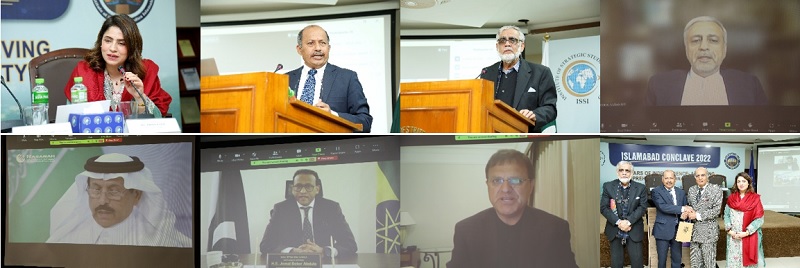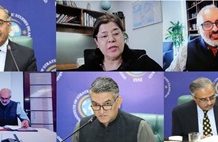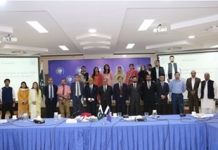Press Release
Islamabad Conclave-2022
Working Session-III: “Pakistan’s Economic Frontiers (Afghanistan, Iran, GCC and Africa)”
December 7, 2022

The Institute of Strategic Studies, Islamabad (ISSI) held its flagship event the Islamabad Conclave-2022 on the Theme “75 Years of Independence: Achieving Comprehensive National Security.” On day one of the conclave, December 7, 2022, the Centre for Afghanistan, Middle East and Africa (CAMEA) hosted the third working session of Islamabad Conclave titled ‘Pakistan’s Economic Frontiers (Afghanistan, Iran, GCC and Africa)’.
The session was moderated by Ms. Amina Khan, Director CAMEA and the Keynote Speaker at the occasion was Ambassador Mansoor Ahmed Khan. Speakers at the occasion included, Engineer Yousef Pashtun, former Afghan Minister and Advisor to the President, Dr. Omar Zakhilwal, former Afghan Ambassador to Pakistan, Ambassador Hossein Molla Abdollahi, Senior Research Fellow, IPIS Iran, Dr Ali Awadh Asseri, former Ambassador of the Kingdom of Saudi Arabia to Pakistan and board member at Rasanah (the International Institute for Iranian Studies) and H. E Jemel Beker Abdula, Ambassador of Ethiopia to Pakistan.
In her introductory remarks, Ms. Amina Khan stated that the world is undergoing several transformations, leading towards new realities and trends, which has thus put into question traditional concepts such as unilateralism and multilateralism. In a rapidly changing world, which is fast transitioning from geo-politics to geo-economics, regional economic integration and regional connectivity have gained utmost importance. Pakistan, serving as an intersection between South, West and Central Asia, is naturally affected by these global trends, which have positive as well as adverse ramifications. She went on to say that the evolving international environment, albeit posing traditional and new challenges, has however, given rise to a unique range of opportunities for Pakistan. While not abandoning geo-politics, Pakistan has begun to focus on geo-economics as a major component of its foreign and economic policy, which stems from Pakistan’s geographical location, and potential as a major harbinger for developmental partnerships, connectivity, and transit trade.
While talking about the immediate region, she stated that building close cooperative relations with Afghanistan is not only a high priority but also a vital component of Pakistan’s vision for a peaceful neighborhood. Pursuing peaceful economic cooperation with Afghanistan through bilateral and transit trade will not only help connect South and Central Asia but also create regional integration. And as we have seen recently both bilateral and transit trade between the two has increased. Since August 2021, we have seen an increase in trade activity between the two, with Afghan exports to Pakistan, jumping from $550 million to $700 million; while Pakistani exports may have declined to Afghanistan, its exports to Central Asian countries through Afghanistan rising by 70 % from $118 million to $202 million in the last 11 months.
Cultivating closer economic ties with the Middle East and the Persian Gulf is a crucial component of Pakistan’s geo-economics outreach. Within this, expanding ties with Iran offers Pakistan a vast array of opportunities for bilateral economic cooperation, paving the way for a mutually beneficial partnership. Enhancing its economic outreach to the GCC countries, particularly, KSA, UAE and Qatar, with whom Pakistan has long-standing brotherly and strategic ties is also a key priority for Pakistan. In doing so, this will help Pakistan identify new avenues as well as carve a niche for itself within the various national rejuvenation plans of these other countries. Similarly, the African continent is emerging as a new and lucrative market that has immense potential. In this regard, Pakistan is increasingly focusing on Africa through its ‘Engage Africa Policy’ in order to explore areas of mutual economic interest through robust economic development and trade, she concluded.
During his keynote address, Ambassador Mansoor Ahmad Khan, highlighted the importance of examining the importance of Pakistan’s economic frontiers. He went on to explain that if we look at the past four decades, Pakistan has missed several opportunities. With regards to Pakistan-Afghanistan ties, he said that the trade potential remains un-realised. Both countries have not been able to manage the fundamentals of their economic interaction and simple basic issues remain unaddressed. Economic interaction between Pakistan and Afghanistan has to be a fundamental part of the bilateral relationship. This can be rectified if Pakistan and Afghanistan have interconnected infrastructure and address basic economic fundamentals. He went on to highlight that the border crossings remain undeveloped and transit trade agreements between Pakistan and Afghanistan also continue to face serious impediments. Both countries will have to come out of this inertia because it affects transit trade as well, he said. With regards to Iran, he said, Pakistan- Iran relationship has not been able to achieve full potential as even regional trade is not taking place in a facilitated manner. There are enormous opportunities, primarily because of Iran’s resources comprising cast oil and diesel reserves. Innovative frameworks, which circumvent US sanctions, for the provision of increased trade needs to be put in place and linkages between Gwadar and Chabahar need to be increased. Iran can be a viable energy exporter to Pakistan. There is also a need to revise modes of payments in such a way which bypass US sanctions.
On Pakistan-GCC relations, Ambassador Mansoor said that the economy of the GCC countries is said to increase to US $14 trillion by 2050. There is great potential for Pakistan within this. Hence, trade links between the GCC as well as export of skilled manpower to GCC countries needs to be strengthened. With regards to Africa, he said that the African continent is one of the fastest growing economies in the world. Trade between Africa and Pakistan is well below potential and there is a lot of scope for Pakistan’s growth here. There is now an increased focus in Pakistan on export diversification as well as labor exports to Africa. Ambassador Mansoor concluded by saying that for the past few years, there has been a lot of talk regarding geo-economic policies. However, this requires a changing of mindset which cannot be merely professed on paper, he said.
Dr. Omar Zakhilwal, also speaking on the subtheme Pakistan’s Economic outreach to Afghanistan,’ said that there is a lot of potential for economic cooperation between Afghanistan and Pakistan, which is necessary for the prosperity and wellbeing for the people of both the countries. This can also be a positive contributor to the challenging relations between the two states. He went on to say that he has in his given capacity tried to play a role in important initiatives such as the Afghanistan Pakistan Trade and Transit Agreement in 2010 and CASA 1000. Talking about his tenure as the Ambassador of Afghanistan to Pakistan in 2016, he said that his focus was to promote and enhance economic cooperation between Afghanistan and Pakistan and to bring the economy to the central stage of economic relations between Kabul and Islamabad. Elaborating on how the bilateral relationship is viewed and managed, he said that the security angle is most dominant and has not done much to alleviate those concerns either and the potential economic relations have also been hindered due to this. He went on to say that trade, transit and economic relations between the two countries are treated as secondary. In Pakistan, economic outreach to Afghanistan is treated as a one sided favor, whereas economic interactions with Pakistan, in Afghanistan are viewed as a dependency. This is why economic activities are only limited to bilateral trade, which over the past ten years has significantly declined. Moreover, he said that greater public or private investments and greater economic integration are missing elements in the economic relations. He went on to say that economic strength or stagnation in Pakistan has a direct impact on Afghanistan. He concluded by saying that unless economics comes to the forefront of bilateral relations, it will not only benefit our economies, but also help the bilateral relationship, durable peace and stability which will in turn serve as a further boost for the relations.
Engineer Yousef Pashtun, while speaking on the subtheme, ‘Pakistan’s Economic outreach to Afghanistan,’ stated that due to the very close geographical location of Afghanistan and Pakistan, joint economic cooperation is obvious. He went on to explain that unfortunately both countries have not given any serious attention to make use of this important aspect of the economic opportunity. The several decades’ long history of relations between Afghanistan and Pakistan shows that any political opposition and instability between the two countries have negatively impacted both. He went on to explain that despite the fact of full economic contact of Afghanistan with Central Asian countries; we cannot bring the Pakistani scale of economic possibilities from there. He explained that one of the main questions for Pakistan can be whether the Afghan construction economy can employ the Pakistani working population on a large scale. While talking about the Afghan mining industry further, he said that according to a very recent American study of the Afghan basic economy, the mining industry of Afghanistan is the greatest in the area. The total cost of Afghan mines is about 15-20 trillion US dollars. It is obvious that Afghanistan with a 35 million population does not have the working capacity. He said that the Afghans need Pakistan to use its human capacity to fill the gap in Afghanistan. This will bring to Afghanistan a big source of economy and this plan can also help the Pakistani population to improve their national economy. Such joint cooperation of this scale is needed by both nations and will help both economies at a large scale, he concluded.
Ambassador Hossein Molla Abdollahi, while speaking on Expanding Pakistan’s Economic Relations with Iran said that the relations between Pakistan and Iran are deep rooted in cultural and historical linkages, with a shared border. In 1964 both Iran and Pakistan along with Turkey established Regional Cooperation for Development (RCD) for regional integration and later on became Economic Cooperation Organization. He said that both Iran and Pakistan have signed various agreements and Memorandum of Understandings MOUs for promotion of bilateral trade. However, it is unfortunate that the level of bilateral trade is quite low although both countries have immense potential. He highlighted that two new border crossing points have been opened between Pakistan and Iran which is a positive step. Both countries are also working on the border markets as well. While talking about the significance of Gwadar and Chabahar he said that both ports are sister ports and they complement each other. He said that both countries are facing various challenges in their bilateral ties which includes domestic, bilateral, regional and international challenges. He said that these challenges have a strong impact on bilateral trade and economic activity between the two. While talking about Afghanistan he said that Afghanistan is an important regional player and peace in Afghanistan is very important for regional stability.
Dr Ali Awadh Asseri, while presenting on “Enhancing Pakistan’s Economic Outreach to the Kingdom of Saudi Arabia (KSA). He said that KSA and Pakistan have a unique, profound, durable relationship which include collaboration in the political, security, economic and cultural spheres of bilateral cooperation. The two nations also have shared concerns and interest in regional and global issues of peace and security. In the recent past, this historic relationship is manifested particularly in close collaboration in both the security and economic spheres. Saudi Arabia’s Vision 2030 offers a vast array of opportunities for Pakistan’s skill force particularly in the IT, tourism and financial sectors. In this regard, the Pakistan embassy in Riyadh should consider setting up a labor attaché, who will be responsible for identifying areas where occupational skills are needed, for workers coming into KSA. He went on to describe how Vision 2030 aims to make the Kingdom a global hub and that Pakistan has ample, skillful youth, which can contribute towards fulfilling KSA’s needs. He also stated that Pakistan needs to showcase the resources it has, and in this regard, the Pakistani Government should have expos in all major cities of the Kingdom so that it can both market resources and also attract investment into Pakistan. He also stated that in the past two decades, Pakistan has made tremendous development and the Pakistani government needs to create a conducive environment for Saudi investors. Unfortunately, the level of bilateral trade between the two sides is very low which necessitates that there must be a fast tracking negotiation agreement to sign a Free Trade Agreement (FTA) and also identify the complementarities between the two countries. He said, at a time when the Kingdom’s Public Investment Fund is diversifying its portfolio, Pakistan should take advantage of this opportunity.
Ambassador Jemel Beker Abdula, said that Pakistan is an important player in international peace and prosperity and it has played a significant role throughout history. This conclave is a very timely initiative and it will play a key role in bringing together national and international policymakers and academia. He said that gone are the days when Africa was labelled as poor, underdeveloped, and ravaged by terrorism and civil war but now things have changed and Africa is an emerging continent with a number of economic opportunities and rightly labelled as the “Land of Opportunities”. He stated that there has been a remarkable improvement in the governance and political systems of African countries over the past few years. He appreciated the Government of Pakistan for the timely initiative of the ‘Engage Africa’ Policy in order to explore the mutual economic interest within the Continent. He went on to say that under the ‘Engage Africa’ Policy Pakistan should establish institutional linkages to boost bilateral, multilateral and regional cooperation for strengthening political, economic, security and cultural ties. Ethiopia is a very important country in the continent and it has a key role in shaping the political, socioeconomic and regional integration of the entire continent due to its significant geo-strategic location. He said that it is imperative for Pakistan to strengthen its ties with Ethiopia which is a gateway to the entire continent. Under Engage Africa Policy Pakistan and Ethiopia are focusing to deepen cooperation which includes political consultations at a high level and a free visa regime for officials and businessmen as well. He stressed that both Pakistan and Ethiopia are working to enhance their economic cooperation which is focused on joint ventures, trade, investment, business, tourism and technology. Chambers of commerce should also play a key role in this regard. In order to be benefited from the Engage Africa Policy Pakistan should enhance its outreach through economic diplomacy, he concluded.











